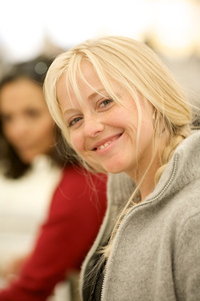Emily Wilkinson
University of Arizona College of Medicine
Age: 27
"This has given me a unique opportunity to participate in laboratory research which I have not considered in my career until this point."
|
I was raised in a rural area of Southern Arizona on 10 acres in a house that my parents built. We had wood-burning stoves, didn't have a phone line until I was a teenager and were quite close to the United States-Mexico border. We were exposed to migration issues at a very young age. In fact, our house was close to a river that often served as a migrant path for people crossing into the U.S., and occasionally we would meet travelers who were in need of food or water. It was a very unique upbringing, and gave me an appreciation for rural life, simple living and the importance of healthcare access issues and technology in areas with limited resources. I studied International Affairs at Northern Arizona University, then worked for a short time in Bolivia and Ecuador with the Foundation for Sustainable Development. I decided to attend graduate school and moved to Tucson, Arizona, where I am currently based for my studies in the MD, MPH programs.
 |
What impact will the 2011 Kean Fellowship have on your future?
I wanted so badly to do my research in Argentina, but I was not sure how I was going to finance the trip. The fellowship helped make that more clear. This has given me a unique opportunity to participate in laboratory research which I have not considered in my career until this point. I will be able to work with a team on a subject that fascinates me and to make connections with researchers in the field that I know will change the course of my path into the future by influencing the priorities I have as a professional.
Describe some of your most memorable travel or work experiences.
I was given the chance to travel as part of a short public health assessment trip to Guinea-Bissau in West Africa with a few fellow medical students and one of my most influential professors and teachers, Ron Pust, MD. The opportunities for self-reflection were countless, and I had multiple conversations about the role of global development work in the world. I also grappled constantly with the raw reality of life as it is for people in places of extreme poverty, finding my surroundings hard to believe despite how "educated" I had become on issues of food scarcity, roles of women in traditional societies and health issues around the globe. Our true education does not come from the papers we write for graduate school or the books we are assigned to read. It comes from the times when our own eyes and hands and feet are able to experience the phenomena we discuss in classrooms as they happen on the ground.
What advice would you give to those just entering school or trying to determine their specialty or field of interest?
Take time to experience more than you think you are going to be interested in. Do not limit yourself the one topic you are comfortable with, but instead take a chance and explore the options you hadn't considered before. Check in with your true self. It is too easy to lose sight of what you really wanted when you came to medicine, and it is essential that you go deep into your heart and find that true motivation again. It is alright to change your mind, as long as it comes from a place of genuine awareness.